University of Murdoch Study: Sleep Quantity and Cognitive Function
VerifiedAdded on 2023/06/09
|13
|3152
|155
Report
AI Summary
This report presents a study conducted at the University of Murdoch that investigates the correlation between sleep quantity and cognitive performance. The research employed the digit span test to assess working memory and cognitive abilities in a cohort of 156 participants. The study measured sleep hours over the past 24 hours and the preceding seven days, correlating these with the participants' performance on the digit span test. The findings revealed a statistically significant positive correlation between average sleep hours over the past seven days and cognitive performance, while no significant association was found between sleep hours from the previous night and cognitive function. The report discusses the implications of these findings, highlighting the importance of adequate sleep for optimal cognitive function, and acknowledges the limitations of the study, such as the need for a more diverse participant pool and further exploration of factors like sleep timing and health issues. It concludes by suggesting areas for future research, including an analysis of various cognitive functions and the impact of cognitive-related diseases on sleep duration.
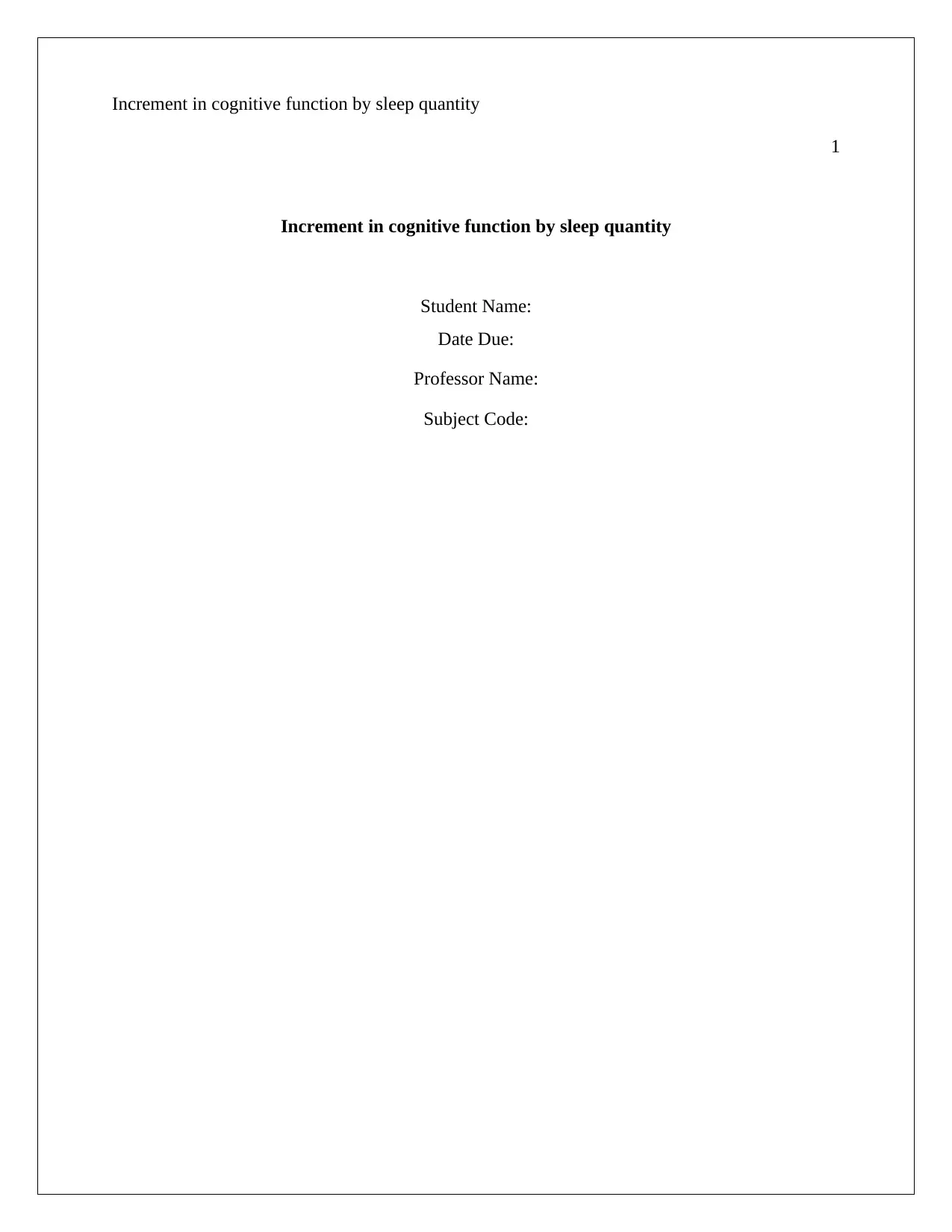
Increment in cognitive function by sleep quantity
1
Increment in cognitive function by sleep quantity
Student Name:
Date Due:
Professor Name:
Subject Code:
1
Increment in cognitive function by sleep quantity
Student Name:
Date Due:
Professor Name:
Subject Code:
Paraphrase This Document
Need a fresh take? Get an instant paraphrase of this document with our AI Paraphraser
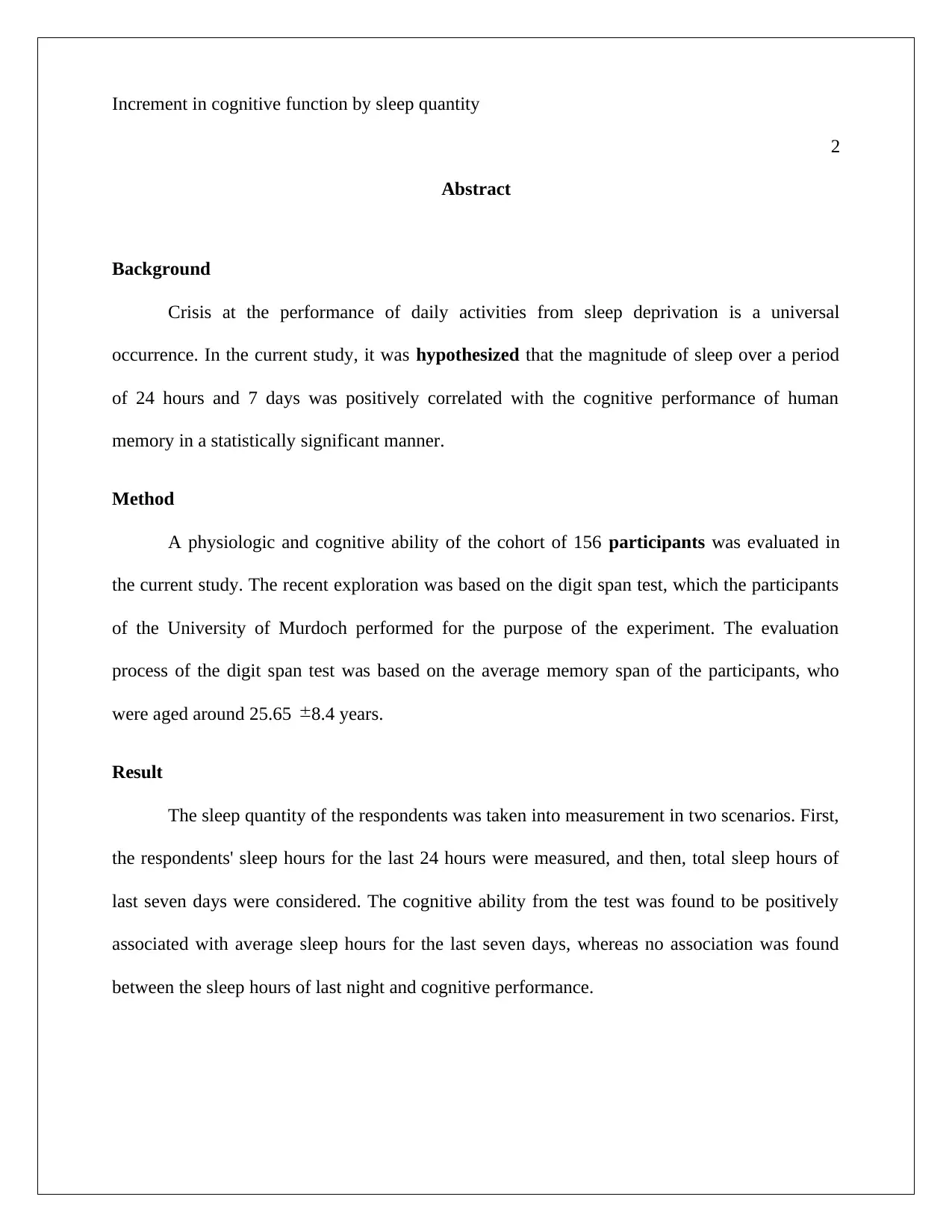
Increment in cognitive function by sleep quantity
2
Abstract
Background
Crisis at the performance of daily activities from sleep deprivation is a universal
occurrence. In the current study, it was hypothesized that the magnitude of sleep over a period
of 24 hours and 7 days was positively correlated with the cognitive performance of human
memory in a statistically significant manner.
Method
A physiologic and cognitive ability of the cohort of 156 participants was evaluated in
the current study. The recent exploration was based on the digit span test, which the participants
of the University of Murdoch performed for the purpose of the experiment. The evaluation
process of the digit span test was based on the average memory span of the participants, who
were aged around 25.65 8.4 years.
Result
The sleep quantity of the respondents was taken into measurement in two scenarios. First,
the respondents' sleep hours for the last 24 hours were measured, and then, total sleep hours of
last seven days were considered. The cognitive ability from the test was found to be positively
associated with average sleep hours for the last seven days, whereas no association was found
between the sleep hours of last night and cognitive performance.
2
Abstract
Background
Crisis at the performance of daily activities from sleep deprivation is a universal
occurrence. In the current study, it was hypothesized that the magnitude of sleep over a period
of 24 hours and 7 days was positively correlated with the cognitive performance of human
memory in a statistically significant manner.
Method
A physiologic and cognitive ability of the cohort of 156 participants was evaluated in
the current study. The recent exploration was based on the digit span test, which the participants
of the University of Murdoch performed for the purpose of the experiment. The evaluation
process of the digit span test was based on the average memory span of the participants, who
were aged around 25.65 8.4 years.
Result
The sleep quantity of the respondents was taken into measurement in two scenarios. First,
the respondents' sleep hours for the last 24 hours were measured, and then, total sleep hours of
last seven days were considered. The cognitive ability from the test was found to be positively
associated with average sleep hours for the last seven days, whereas no association was found
between the sleep hours of last night and cognitive performance.
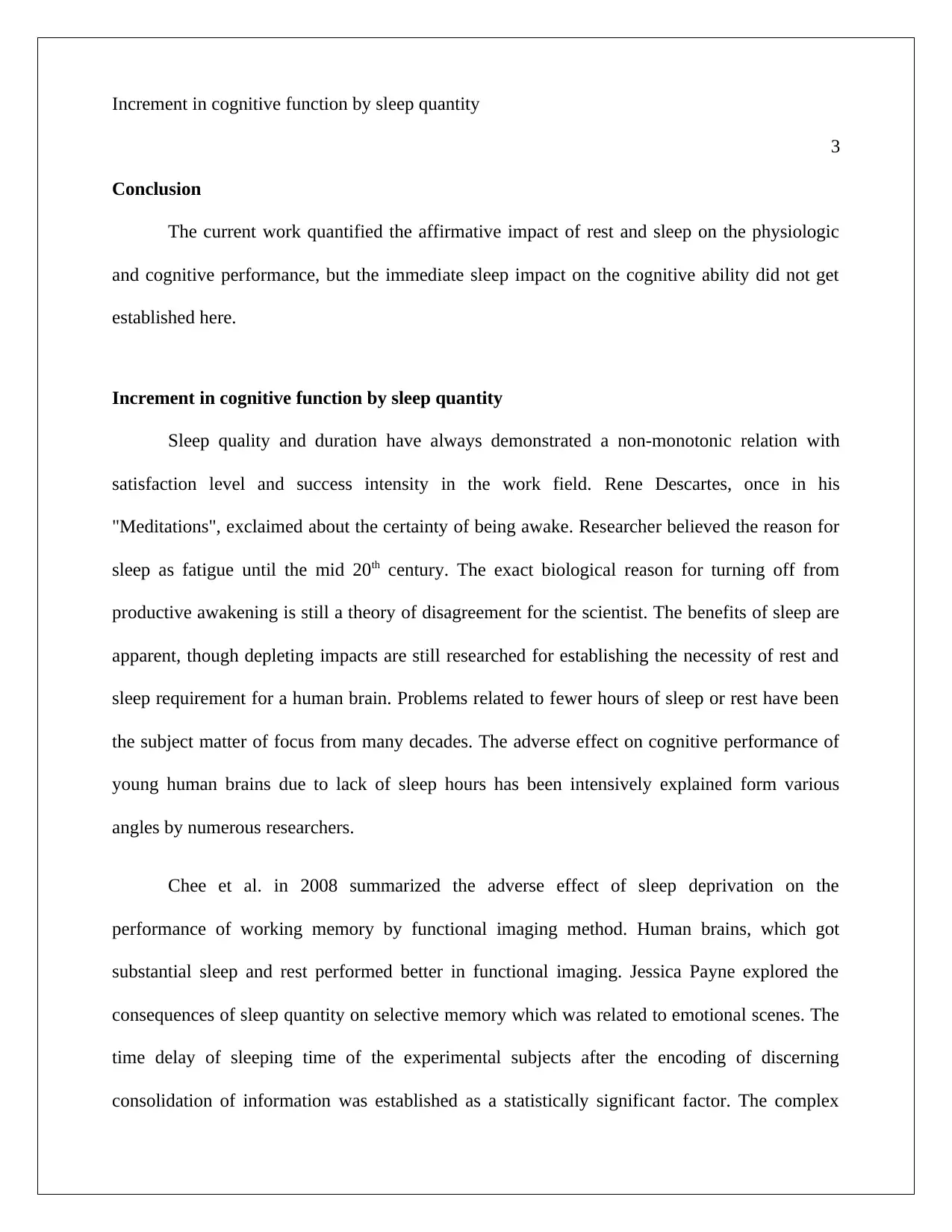
Increment in cognitive function by sleep quantity
3
Conclusion
The current work quantified the affirmative impact of rest and sleep on the physiologic
and cognitive performance, but the immediate sleep impact on the cognitive ability did not get
established here.
Increment in cognitive function by sleep quantity
Sleep quality and duration have always demonstrated a non-monotonic relation with
satisfaction level and success intensity in the work field. Rene Descartes, once in his
"Meditations", exclaimed about the certainty of being awake. Researcher believed the reason for
sleep as fatigue until the mid 20th century. The exact biological reason for turning off from
productive awakening is still a theory of disagreement for the scientist. The benefits of sleep are
apparent, though depleting impacts are still researched for establishing the necessity of rest and
sleep requirement for a human brain. Problems related to fewer hours of sleep or rest have been
the subject matter of focus from many decades. The adverse effect on cognitive performance of
young human brains due to lack of sleep hours has been intensively explained form various
angles by numerous researchers.
Chee et al. in 2008 summarized the adverse effect of sleep deprivation on the
performance of working memory by functional imaging method. Human brains, which got
substantial sleep and rest performed better in functional imaging. Jessica Payne explored the
consequences of sleep quantity on selective memory which was related to emotional scenes. The
time delay of sleeping time of the experimental subjects after the encoding of discerning
consolidation of information was established as a statistically significant factor. The complex
3
Conclusion
The current work quantified the affirmative impact of rest and sleep on the physiologic
and cognitive performance, but the immediate sleep impact on the cognitive ability did not get
established here.
Increment in cognitive function by sleep quantity
Sleep quality and duration have always demonstrated a non-monotonic relation with
satisfaction level and success intensity in the work field. Rene Descartes, once in his
"Meditations", exclaimed about the certainty of being awake. Researcher believed the reason for
sleep as fatigue until the mid 20th century. The exact biological reason for turning off from
productive awakening is still a theory of disagreement for the scientist. The benefits of sleep are
apparent, though depleting impacts are still researched for establishing the necessity of rest and
sleep requirement for a human brain. Problems related to fewer hours of sleep or rest have been
the subject matter of focus from many decades. The adverse effect on cognitive performance of
young human brains due to lack of sleep hours has been intensively explained form various
angles by numerous researchers.
Chee et al. in 2008 summarized the adverse effect of sleep deprivation on the
performance of working memory by functional imaging method. Human brains, which got
substantial sleep and rest performed better in functional imaging. Jessica Payne explored the
consequences of sleep quantity on selective memory which was related to emotional scenes. The
time delay of sleeping time of the experimental subjects after the encoding of discerning
consolidation of information was established as a statistically significant factor. The complex
⊘ This is a preview!⊘
Do you want full access?
Subscribe today to unlock all pages.

Trusted by 1+ million students worldwide
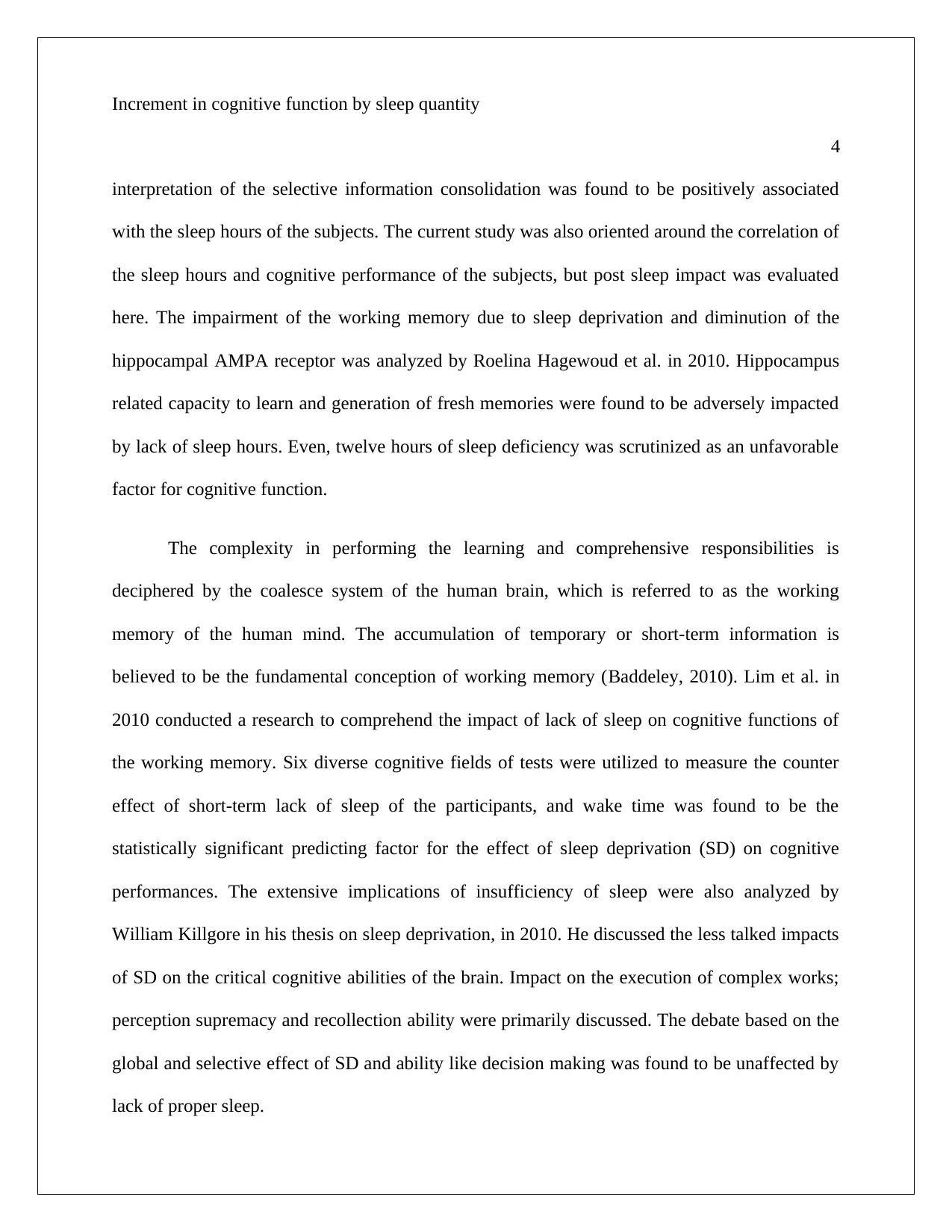
Increment in cognitive function by sleep quantity
4
interpretation of the selective information consolidation was found to be positively associated
with the sleep hours of the subjects. The current study was also oriented around the correlation of
the sleep hours and cognitive performance of the subjects, but post sleep impact was evaluated
here. The impairment of the working memory due to sleep deprivation and diminution of the
hippocampal AMPA receptor was analyzed by Roelina Hagewoud et al. in 2010. Hippocampus
related capacity to learn and generation of fresh memories were found to be adversely impacted
by lack of sleep hours. Even, twelve hours of sleep deficiency was scrutinized as an unfavorable
factor for cognitive function.
The complexity in performing the learning and comprehensive responsibilities is
deciphered by the coalesce system of the human brain, which is referred to as the working
memory of the human mind. The accumulation of temporary or short-term information is
believed to be the fundamental conception of working memory (Baddeley, 2010). Lim et al. in
2010 conducted a research to comprehend the impact of lack of sleep on cognitive functions of
the working memory. Six diverse cognitive fields of tests were utilized to measure the counter
effect of short-term lack of sleep of the participants, and wake time was found to be the
statistically significant predicting factor for the effect of sleep deprivation (SD) on cognitive
performances. The extensive implications of insufficiency of sleep were also analyzed by
William Killgore in his thesis on sleep deprivation, in 2010. He discussed the less talked impacts
of SD on the critical cognitive abilities of the brain. Impact on the execution of complex works;
perception supremacy and recollection ability were primarily discussed. The debate based on the
global and selective effect of SD and ability like decision making was found to be unaffected by
lack of proper sleep.
4
interpretation of the selective information consolidation was found to be positively associated
with the sleep hours of the subjects. The current study was also oriented around the correlation of
the sleep hours and cognitive performance of the subjects, but post sleep impact was evaluated
here. The impairment of the working memory due to sleep deprivation and diminution of the
hippocampal AMPA receptor was analyzed by Roelina Hagewoud et al. in 2010. Hippocampus
related capacity to learn and generation of fresh memories were found to be adversely impacted
by lack of sleep hours. Even, twelve hours of sleep deficiency was scrutinized as an unfavorable
factor for cognitive function.
The complexity in performing the learning and comprehensive responsibilities is
deciphered by the coalesce system of the human brain, which is referred to as the working
memory of the human mind. The accumulation of temporary or short-term information is
believed to be the fundamental conception of working memory (Baddeley, 2010). Lim et al. in
2010 conducted a research to comprehend the impact of lack of sleep on cognitive functions of
the working memory. Six diverse cognitive fields of tests were utilized to measure the counter
effect of short-term lack of sleep of the participants, and wake time was found to be the
statistically significant predicting factor for the effect of sleep deprivation (SD) on cognitive
performances. The extensive implications of insufficiency of sleep were also analyzed by
William Killgore in his thesis on sleep deprivation, in 2010. He discussed the less talked impacts
of SD on the critical cognitive abilities of the brain. Impact on the execution of complex works;
perception supremacy and recollection ability were primarily discussed. The debate based on the
global and selective effect of SD and ability like decision making was found to be unaffected by
lack of proper sleep.
Paraphrase This Document
Need a fresh take? Get an instant paraphrase of this document with our AI Paraphraser
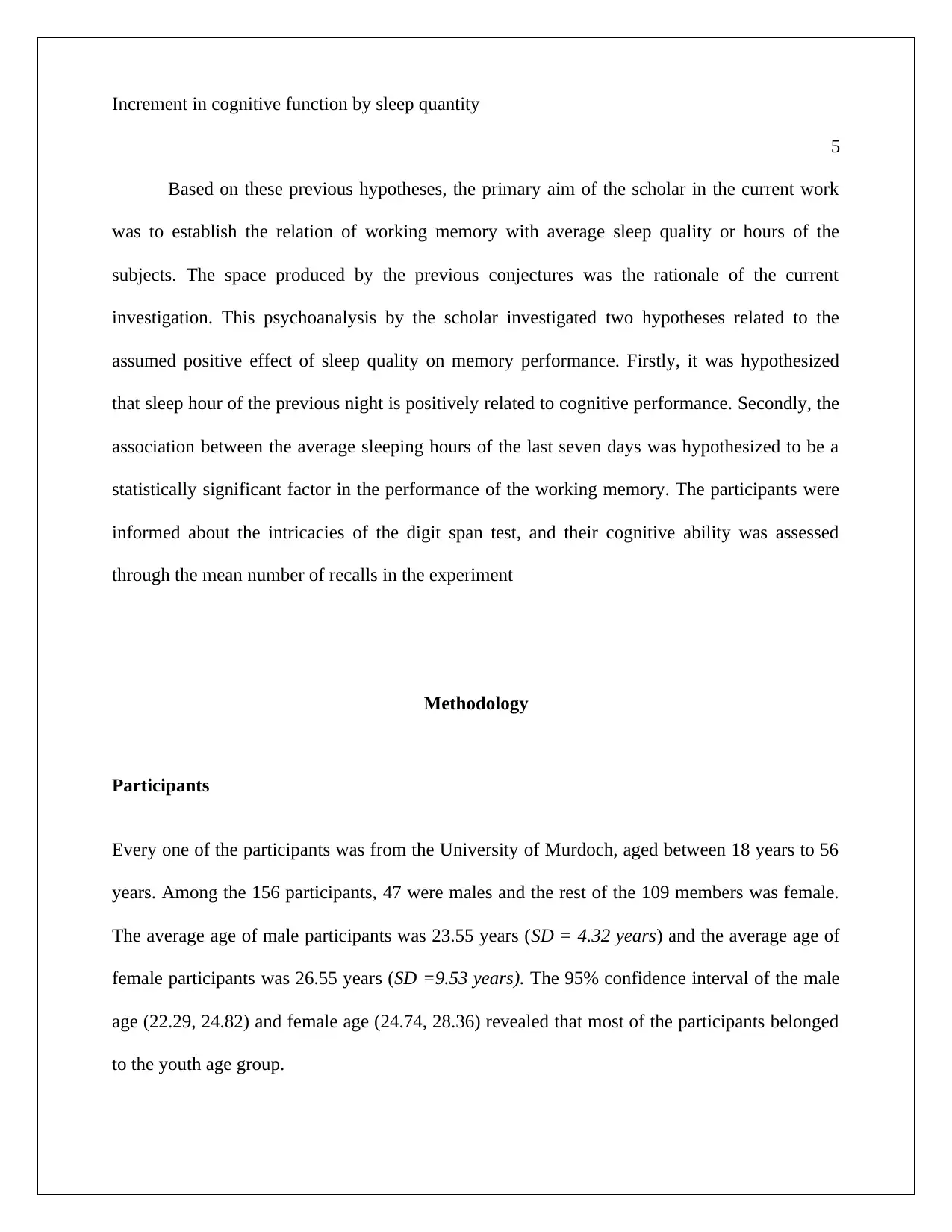
Increment in cognitive function by sleep quantity
5
Based on these previous hypotheses, the primary aim of the scholar in the current work
was to establish the relation of working memory with average sleep quality or hours of the
subjects. The space produced by the previous conjectures was the rationale of the current
investigation. This psychoanalysis by the scholar investigated two hypotheses related to the
assumed positive effect of sleep quality on memory performance. Firstly, it was hypothesized
that sleep hour of the previous night is positively related to cognitive performance. Secondly, the
association between the average sleeping hours of the last seven days was hypothesized to be a
statistically significant factor in the performance of the working memory. The participants were
informed about the intricacies of the digit span test, and their cognitive ability was assessed
through the mean number of recalls in the experiment
Methodology
Participants
Every one of the participants was from the University of Murdoch, aged between 18 years to 56
years. Among the 156 participants, 47 were males and the rest of the 109 members was female.
The average age of male participants was 23.55 years (SD = 4.32 years) and the average age of
female participants was 26.55 years (SD =9.53 years). The 95% confidence interval of the male
age (22.29, 24.82) and female age (24.74, 28.36) revealed that most of the participants belonged
to the youth age group.
5
Based on these previous hypotheses, the primary aim of the scholar in the current work
was to establish the relation of working memory with average sleep quality or hours of the
subjects. The space produced by the previous conjectures was the rationale of the current
investigation. This psychoanalysis by the scholar investigated two hypotheses related to the
assumed positive effect of sleep quality on memory performance. Firstly, it was hypothesized
that sleep hour of the previous night is positively related to cognitive performance. Secondly, the
association between the average sleeping hours of the last seven days was hypothesized to be a
statistically significant factor in the performance of the working memory. The participants were
informed about the intricacies of the digit span test, and their cognitive ability was assessed
through the mean number of recalls in the experiment
Methodology
Participants
Every one of the participants was from the University of Murdoch, aged between 18 years to 56
years. Among the 156 participants, 47 were males and the rest of the 109 members was female.
The average age of male participants was 23.55 years (SD = 4.32 years) and the average age of
female participants was 26.55 years (SD =9.53 years). The 95% confidence interval of the male
age (22.29, 24.82) and female age (24.74, 28.36) revealed that most of the participants belonged
to the youth age group.
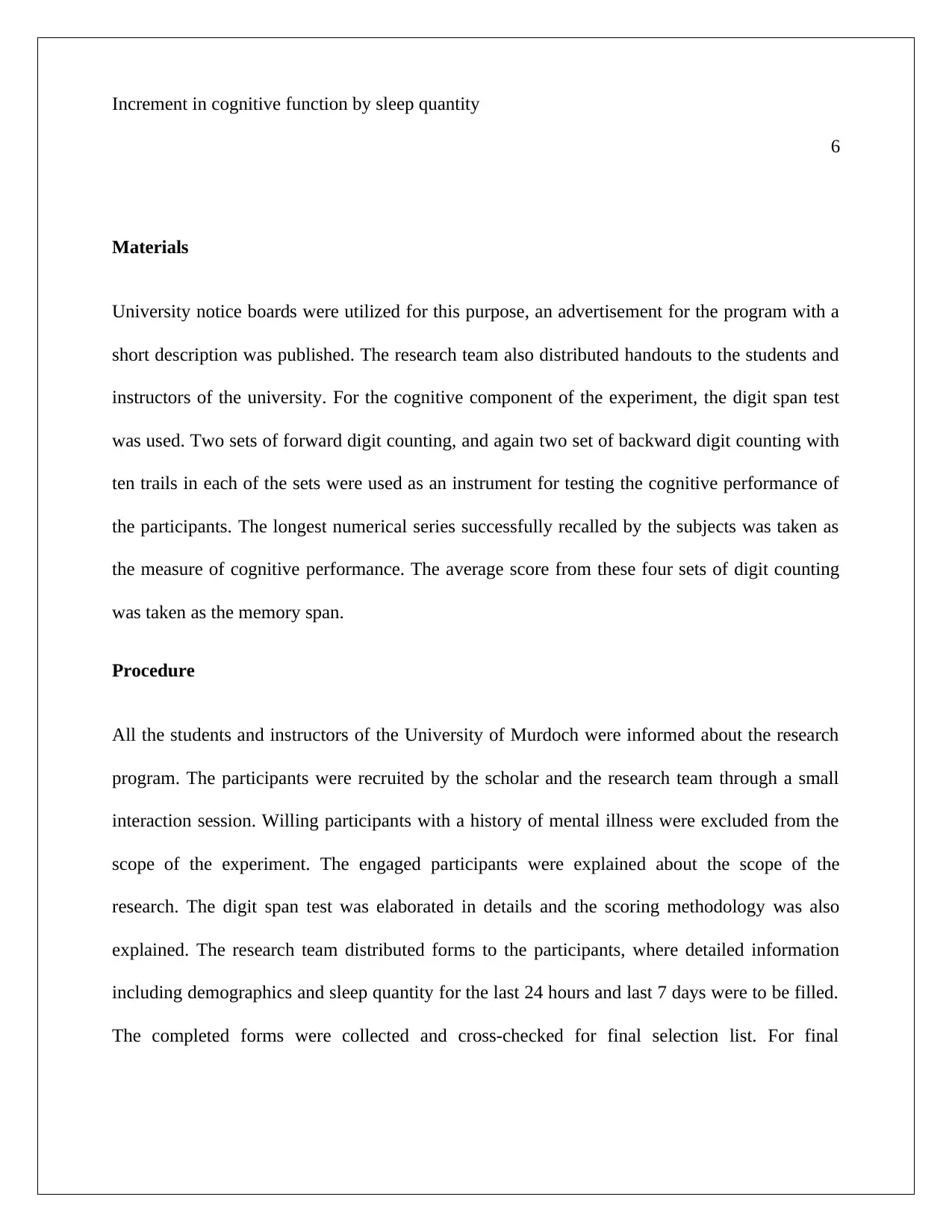
Increment in cognitive function by sleep quantity
6
Materials
University notice boards were utilized for this purpose, an advertisement for the program with a
short description was published. The research team also distributed handouts to the students and
instructors of the university. For the cognitive component of the experiment, the digit span test
was used. Two sets of forward digit counting, and again two set of backward digit counting with
ten trails in each of the sets were used as an instrument for testing the cognitive performance of
the participants. The longest numerical series successfully recalled by the subjects was taken as
the measure of cognitive performance. The average score from these four sets of digit counting
was taken as the memory span.
Procedure
All the students and instructors of the University of Murdoch were informed about the research
program. The participants were recruited by the scholar and the research team through a small
interaction session. Willing participants with a history of mental illness were excluded from the
scope of the experiment. The engaged participants were explained about the scope of the
research. The digit span test was elaborated in details and the scoring methodology was also
explained. The research team distributed forms to the participants, where detailed information
including demographics and sleep quantity for the last 24 hours and last 7 days were to be filled.
The completed forms were collected and cross-checked for final selection list. For final
6
Materials
University notice boards were utilized for this purpose, an advertisement for the program with a
short description was published. The research team also distributed handouts to the students and
instructors of the university. For the cognitive component of the experiment, the digit span test
was used. Two sets of forward digit counting, and again two set of backward digit counting with
ten trails in each of the sets were used as an instrument for testing the cognitive performance of
the participants. The longest numerical series successfully recalled by the subjects was taken as
the measure of cognitive performance. The average score from these four sets of digit counting
was taken as the memory span.
Procedure
All the students and instructors of the University of Murdoch were informed about the research
program. The participants were recruited by the scholar and the research team through a small
interaction session. Willing participants with a history of mental illness were excluded from the
scope of the experiment. The engaged participants were explained about the scope of the
research. The digit span test was elaborated in details and the scoring methodology was also
explained. The research team distributed forms to the participants, where detailed information
including demographics and sleep quantity for the last 24 hours and last 7 days were to be filled.
The completed forms were collected and cross-checked for final selection list. For final
⊘ This is a preview!⊘
Do you want full access?
Subscribe today to unlock all pages.

Trusted by 1+ million students worldwide
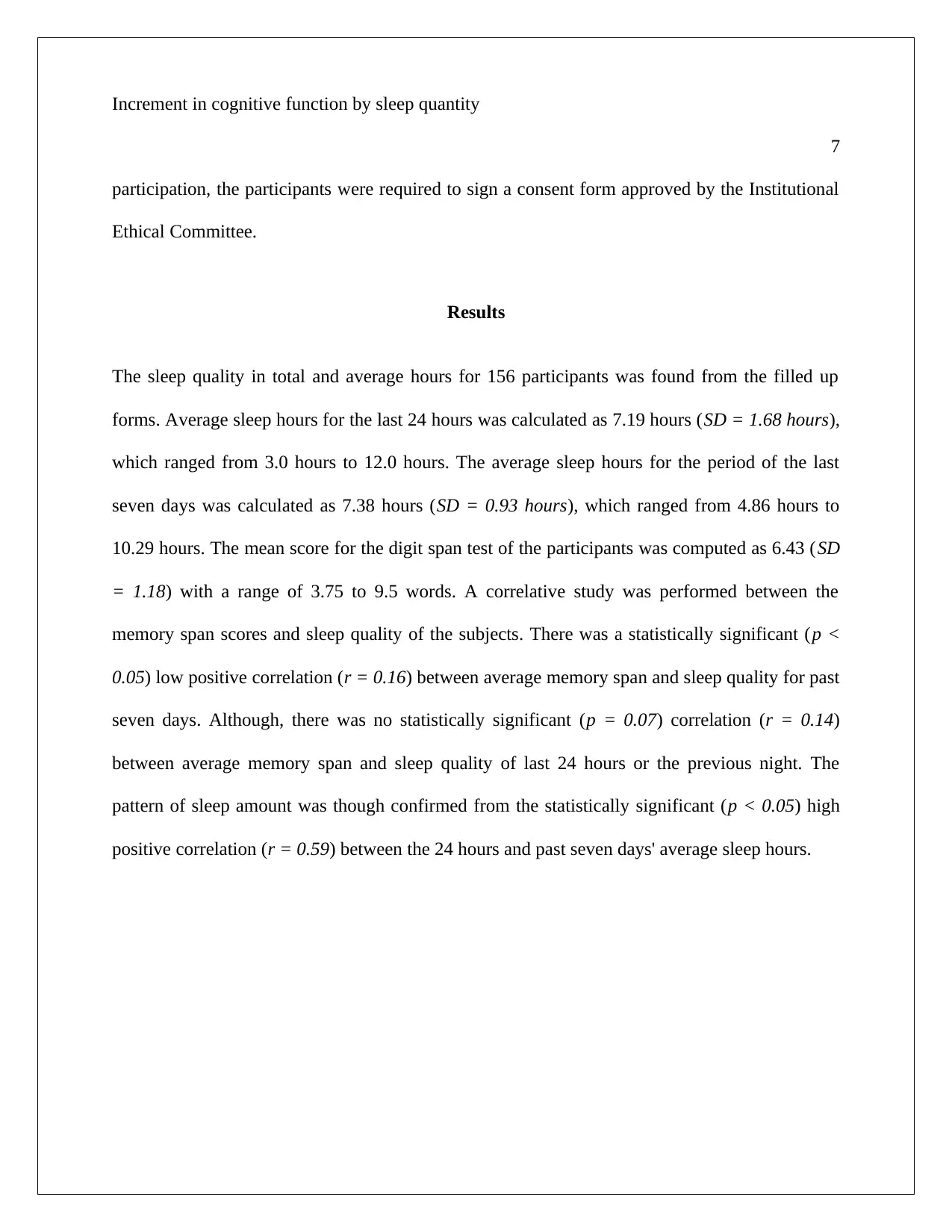
Increment in cognitive function by sleep quantity
7
participation, the participants were required to sign a consent form approved by the Institutional
Ethical Committee.
Results
The sleep quality in total and average hours for 156 participants was found from the filled up
forms. Average sleep hours for the last 24 hours was calculated as 7.19 hours (SD = 1.68 hours),
which ranged from 3.0 hours to 12.0 hours. The average sleep hours for the period of the last
seven days was calculated as 7.38 hours (SD = 0.93 hours), which ranged from 4.86 hours to
10.29 hours. The mean score for the digit span test of the participants was computed as 6.43 (SD
= 1.18) with a range of 3.75 to 9.5 words. A correlative study was performed between the
memory span scores and sleep quality of the subjects. There was a statistically significant (p <
0.05) low positive correlation (r = 0.16) between average memory span and sleep quality for past
seven days. Although, there was no statistically significant (p = 0.07) correlation (r = 0.14)
between average memory span and sleep quality of last 24 hours or the previous night. The
pattern of sleep amount was though confirmed from the statistically significant (p < 0.05) high
positive correlation (r = 0.59) between the 24 hours and past seven days' average sleep hours.
7
participation, the participants were required to sign a consent form approved by the Institutional
Ethical Committee.
Results
The sleep quality in total and average hours for 156 participants was found from the filled up
forms. Average sleep hours for the last 24 hours was calculated as 7.19 hours (SD = 1.68 hours),
which ranged from 3.0 hours to 12.0 hours. The average sleep hours for the period of the last
seven days was calculated as 7.38 hours (SD = 0.93 hours), which ranged from 4.86 hours to
10.29 hours. The mean score for the digit span test of the participants was computed as 6.43 (SD
= 1.18) with a range of 3.75 to 9.5 words. A correlative study was performed between the
memory span scores and sleep quality of the subjects. There was a statistically significant (p <
0.05) low positive correlation (r = 0.16) between average memory span and sleep quality for past
seven days. Although, there was no statistically significant (p = 0.07) correlation (r = 0.14)
between average memory span and sleep quality of last 24 hours or the previous night. The
pattern of sleep amount was though confirmed from the statistically significant (p < 0.05) high
positive correlation (r = 0.59) between the 24 hours and past seven days' average sleep hours.
Paraphrase This Document
Need a fresh take? Get an instant paraphrase of this document with our AI Paraphraser
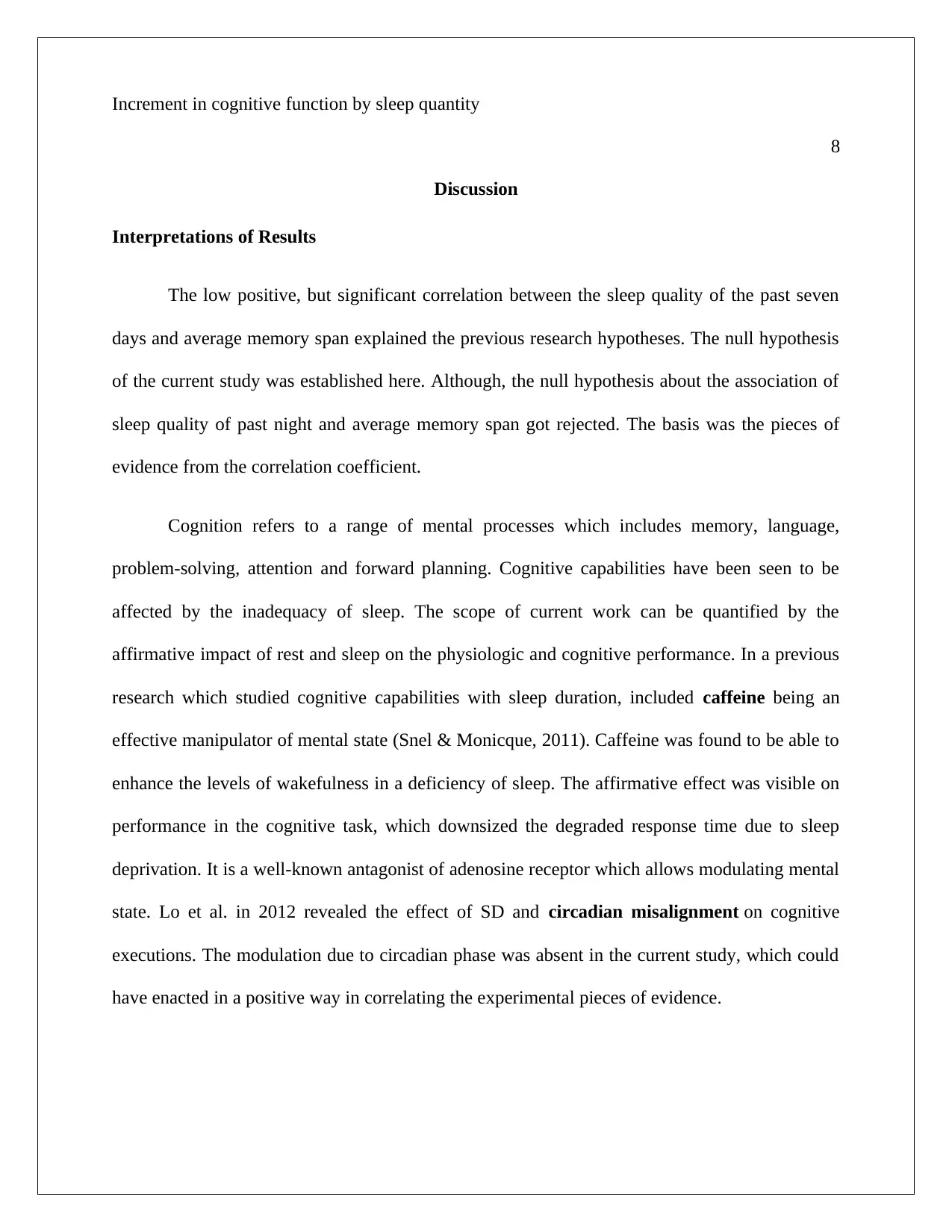
Increment in cognitive function by sleep quantity
8
Discussion
Interpretations of Results
The low positive, but significant correlation between the sleep quality of the past seven
days and average memory span explained the previous research hypotheses. The null hypothesis
of the current study was established here. Although, the null hypothesis about the association of
sleep quality of past night and average memory span got rejected. The basis was the pieces of
evidence from the correlation coefficient.
Cognition refers to a range of mental processes which includes memory, language,
problem-solving, attention and forward planning. Cognitive capabilities have been seen to be
affected by the inadequacy of sleep. The scope of current work can be quantified by the
affirmative impact of rest and sleep on the physiologic and cognitive performance. In a previous
research which studied cognitive capabilities with sleep duration, included caffeine being an
effective manipulator of mental state (Snel & Monicque, 2011). Caffeine was found to be able to
enhance the levels of wakefulness in a deficiency of sleep. The affirmative effect was visible on
performance in the cognitive task, which downsized the degraded response time due to sleep
deprivation. It is a well-known antagonist of adenosine receptor which allows modulating mental
state. Lo et al. in 2012 revealed the effect of SD and circadian misalignment on cognitive
executions. The modulation due to circadian phase was absent in the current study, which could
have enacted in a positive way in correlating the experimental pieces of evidence.
8
Discussion
Interpretations of Results
The low positive, but significant correlation between the sleep quality of the past seven
days and average memory span explained the previous research hypotheses. The null hypothesis
of the current study was established here. Although, the null hypothesis about the association of
sleep quality of past night and average memory span got rejected. The basis was the pieces of
evidence from the correlation coefficient.
Cognition refers to a range of mental processes which includes memory, language,
problem-solving, attention and forward planning. Cognitive capabilities have been seen to be
affected by the inadequacy of sleep. The scope of current work can be quantified by the
affirmative impact of rest and sleep on the physiologic and cognitive performance. In a previous
research which studied cognitive capabilities with sleep duration, included caffeine being an
effective manipulator of mental state (Snel & Monicque, 2011). Caffeine was found to be able to
enhance the levels of wakefulness in a deficiency of sleep. The affirmative effect was visible on
performance in the cognitive task, which downsized the degraded response time due to sleep
deprivation. It is a well-known antagonist of adenosine receptor which allows modulating mental
state. Lo et al. in 2012 revealed the effect of SD and circadian misalignment on cognitive
executions. The modulation due to circadian phase was absent in the current study, which could
have enacted in a positive way in correlating the experimental pieces of evidence.
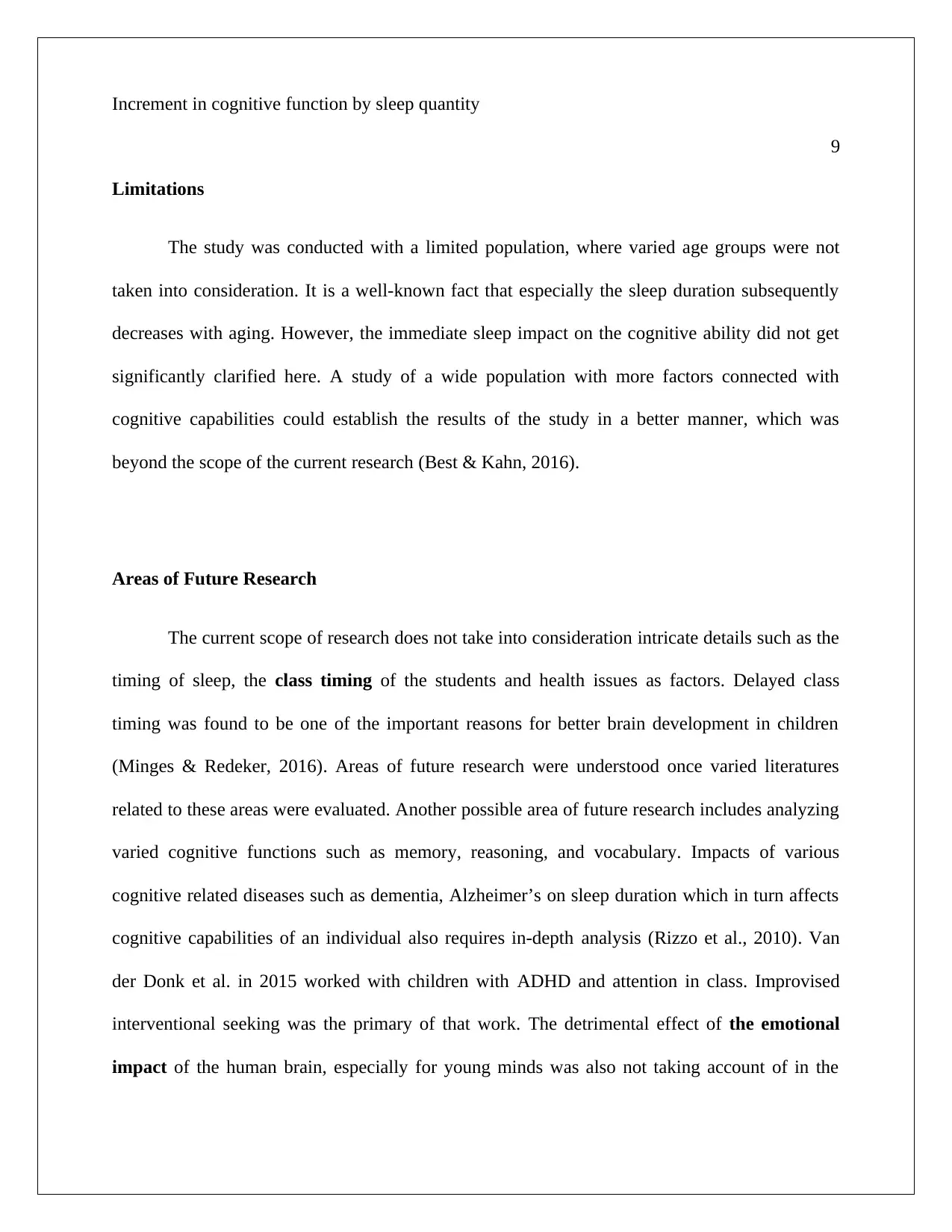
Increment in cognitive function by sleep quantity
9
Limitations
The study was conducted with a limited population, where varied age groups were not
taken into consideration. It is a well-known fact that especially the sleep duration subsequently
decreases with aging. However, the immediate sleep impact on the cognitive ability did not get
significantly clarified here. A study of a wide population with more factors connected with
cognitive capabilities could establish the results of the study in a better manner, which was
beyond the scope of the current research (Best & Kahn, 2016).
Areas of Future Research
The current scope of research does not take into consideration intricate details such as the
timing of sleep, the class timing of the students and health issues as factors. Delayed class
timing was found to be one of the important reasons for better brain development in children
(Minges & Redeker, 2016). Areas of future research were understood once varied literatures
related to these areas were evaluated. Another possible area of future research includes analyzing
varied cognitive functions such as memory, reasoning, and vocabulary. Impacts of various
cognitive related diseases such as dementia, Alzheimer’s on sleep duration which in turn affects
cognitive capabilities of an individual also requires in-depth analysis (Rizzo et al., 2010). Van
der Donk et al. in 2015 worked with children with ADHD and attention in class. Improvised
interventional seeking was the primary of that work. The detrimental effect of the emotional
impact of the human brain, especially for young minds was also not taking account of in the
9
Limitations
The study was conducted with a limited population, where varied age groups were not
taken into consideration. It is a well-known fact that especially the sleep duration subsequently
decreases with aging. However, the immediate sleep impact on the cognitive ability did not get
significantly clarified here. A study of a wide population with more factors connected with
cognitive capabilities could establish the results of the study in a better manner, which was
beyond the scope of the current research (Best & Kahn, 2016).
Areas of Future Research
The current scope of research does not take into consideration intricate details such as the
timing of sleep, the class timing of the students and health issues as factors. Delayed class
timing was found to be one of the important reasons for better brain development in children
(Minges & Redeker, 2016). Areas of future research were understood once varied literatures
related to these areas were evaluated. Another possible area of future research includes analyzing
varied cognitive functions such as memory, reasoning, and vocabulary. Impacts of various
cognitive related diseases such as dementia, Alzheimer’s on sleep duration which in turn affects
cognitive capabilities of an individual also requires in-depth analysis (Rizzo et al., 2010). Van
der Donk et al. in 2015 worked with children with ADHD and attention in class. Improvised
interventional seeking was the primary of that work. The detrimental effect of the emotional
impact of the human brain, especially for young minds was also not taking account of in the
⊘ This is a preview!⊘
Do you want full access?
Subscribe today to unlock all pages.

Trusted by 1+ million students worldwide
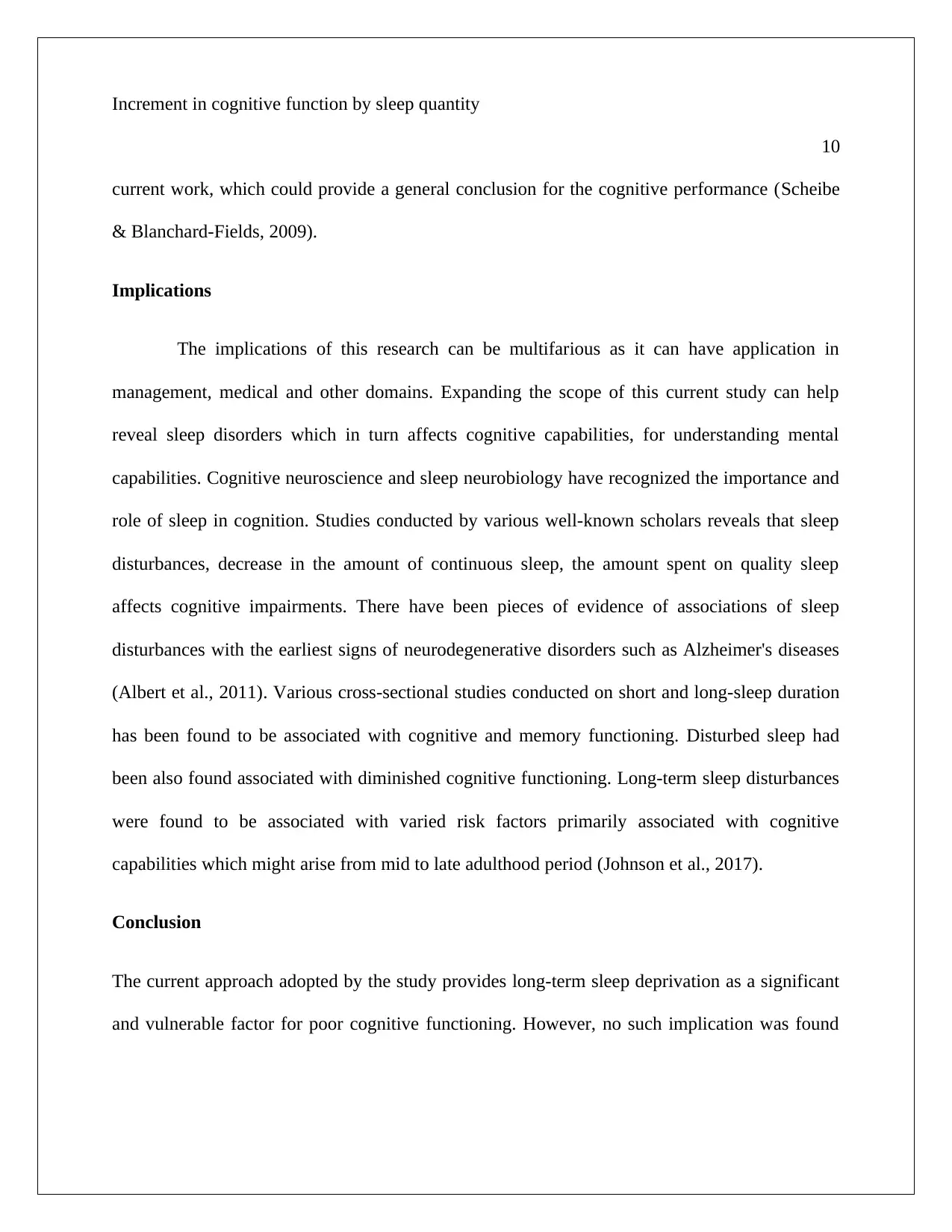
Increment in cognitive function by sleep quantity
10
current work, which could provide a general conclusion for the cognitive performance (Scheibe
& Blanchard-Fields, 2009).
Implications
The implications of this research can be multifarious as it can have application in
management, medical and other domains. Expanding the scope of this current study can help
reveal sleep disorders which in turn affects cognitive capabilities, for understanding mental
capabilities. Cognitive neuroscience and sleep neurobiology have recognized the importance and
role of sleep in cognition. Studies conducted by various well-known scholars reveals that sleep
disturbances, decrease in the amount of continuous sleep, the amount spent on quality sleep
affects cognitive impairments. There have been pieces of evidence of associations of sleep
disturbances with the earliest signs of neurodegenerative disorders such as Alzheimer's diseases
(Albert et al., 2011). Various cross-sectional studies conducted on short and long-sleep duration
has been found to be associated with cognitive and memory functioning. Disturbed sleep had
been also found associated with diminished cognitive functioning. Long-term sleep disturbances
were found to be associated with varied risk factors primarily associated with cognitive
capabilities which might arise from mid to late adulthood period (Johnson et al., 2017).
Conclusion
The current approach adopted by the study provides long-term sleep deprivation as a significant
and vulnerable factor for poor cognitive functioning. However, no such implication was found
10
current work, which could provide a general conclusion for the cognitive performance (Scheibe
& Blanchard-Fields, 2009).
Implications
The implications of this research can be multifarious as it can have application in
management, medical and other domains. Expanding the scope of this current study can help
reveal sleep disorders which in turn affects cognitive capabilities, for understanding mental
capabilities. Cognitive neuroscience and sleep neurobiology have recognized the importance and
role of sleep in cognition. Studies conducted by various well-known scholars reveals that sleep
disturbances, decrease in the amount of continuous sleep, the amount spent on quality sleep
affects cognitive impairments. There have been pieces of evidence of associations of sleep
disturbances with the earliest signs of neurodegenerative disorders such as Alzheimer's diseases
(Albert et al., 2011). Various cross-sectional studies conducted on short and long-sleep duration
has been found to be associated with cognitive and memory functioning. Disturbed sleep had
been also found associated with diminished cognitive functioning. Long-term sleep disturbances
were found to be associated with varied risk factors primarily associated with cognitive
capabilities which might arise from mid to late adulthood period (Johnson et al., 2017).
Conclusion
The current approach adopted by the study provides long-term sleep deprivation as a significant
and vulnerable factor for poor cognitive functioning. However, no such implication was found
Paraphrase This Document
Need a fresh take? Get an instant paraphrase of this document with our AI Paraphraser
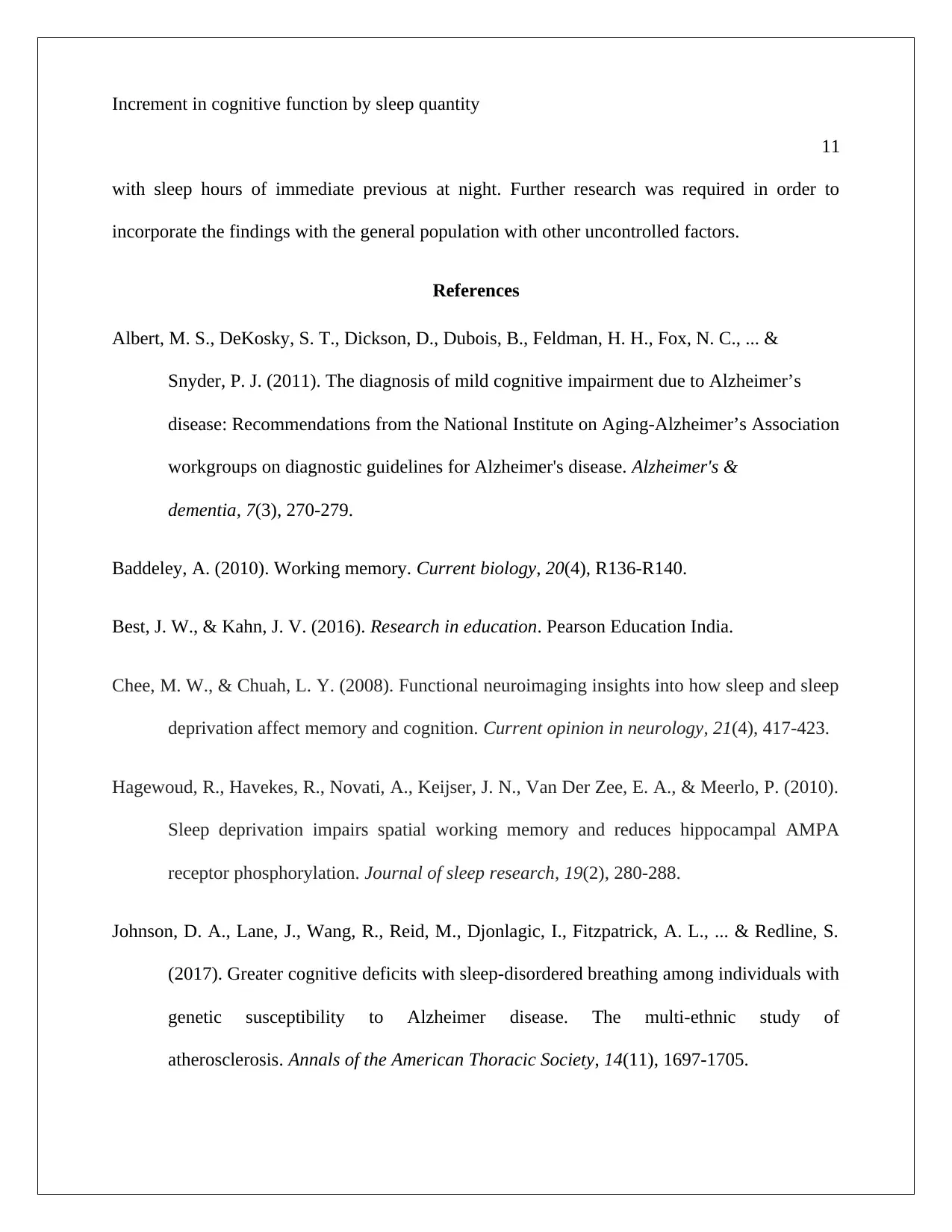
Increment in cognitive function by sleep quantity
11
with sleep hours of immediate previous at night. Further research was required in order to
incorporate the findings with the general population with other uncontrolled factors.
References
Albert, M. S., DeKosky, S. T., Dickson, D., Dubois, B., Feldman, H. H., Fox, N. C., ... &
Snyder, P. J. (2011). The diagnosis of mild cognitive impairment due to Alzheimer’s
disease: Recommendations from the National Institute on Aging-Alzheimer’s Association
workgroups on diagnostic guidelines for Alzheimer's disease. Alzheimer's &
dementia, 7(3), 270-279.
Baddeley, A. (2010). Working memory. Current biology, 20(4), R136-R140.
Best, J. W., & Kahn, J. V. (2016). Research in education. Pearson Education India.
Chee, M. W., & Chuah, L. Y. (2008). Functional neuroimaging insights into how sleep and sleep
deprivation affect memory and cognition. Current opinion in neurology, 21(4), 417-423.
Hagewoud, R., Havekes, R., Novati, A., Keijser, J. N., Van Der Zee, E. A., & Meerlo, P. (2010).
Sleep deprivation impairs spatial working memory and reduces hippocampal AMPA
receptor phosphorylation. Journal of sleep research, 19(2), 280-288.
Johnson, D. A., Lane, J., Wang, R., Reid, M., Djonlagic, I., Fitzpatrick, A. L., ... & Redline, S.
(2017). Greater cognitive deficits with sleep-disordered breathing among individuals with
genetic susceptibility to Alzheimer disease. The multi-ethnic study of
atherosclerosis. Annals of the American Thoracic Society, 14(11), 1697-1705.
11
with sleep hours of immediate previous at night. Further research was required in order to
incorporate the findings with the general population with other uncontrolled factors.
References
Albert, M. S., DeKosky, S. T., Dickson, D., Dubois, B., Feldman, H. H., Fox, N. C., ... &
Snyder, P. J. (2011). The diagnosis of mild cognitive impairment due to Alzheimer’s
disease: Recommendations from the National Institute on Aging-Alzheimer’s Association
workgroups on diagnostic guidelines for Alzheimer's disease. Alzheimer's &
dementia, 7(3), 270-279.
Baddeley, A. (2010). Working memory. Current biology, 20(4), R136-R140.
Best, J. W., & Kahn, J. V. (2016). Research in education. Pearson Education India.
Chee, M. W., & Chuah, L. Y. (2008). Functional neuroimaging insights into how sleep and sleep
deprivation affect memory and cognition. Current opinion in neurology, 21(4), 417-423.
Hagewoud, R., Havekes, R., Novati, A., Keijser, J. N., Van Der Zee, E. A., & Meerlo, P. (2010).
Sleep deprivation impairs spatial working memory and reduces hippocampal AMPA
receptor phosphorylation. Journal of sleep research, 19(2), 280-288.
Johnson, D. A., Lane, J., Wang, R., Reid, M., Djonlagic, I., Fitzpatrick, A. L., ... & Redline, S.
(2017). Greater cognitive deficits with sleep-disordered breathing among individuals with
genetic susceptibility to Alzheimer disease. The multi-ethnic study of
atherosclerosis. Annals of the American Thoracic Society, 14(11), 1697-1705.
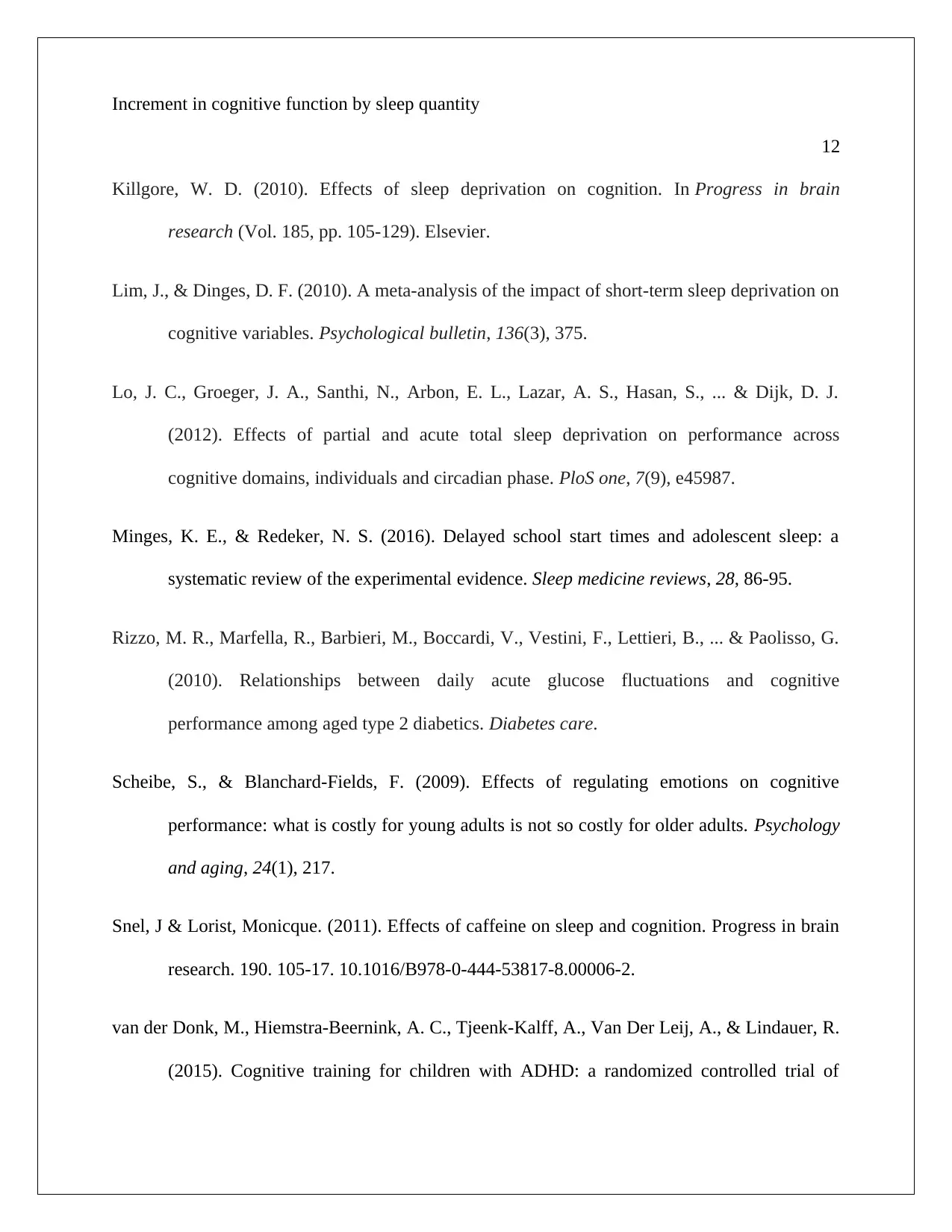
Increment in cognitive function by sleep quantity
12
Killgore, W. D. (2010). Effects of sleep deprivation on cognition. In Progress in brain
research (Vol. 185, pp. 105-129). Elsevier.
Lim, J., & Dinges, D. F. (2010). A meta-analysis of the impact of short-term sleep deprivation on
cognitive variables. Psychological bulletin, 136(3), 375.
Lo, J. C., Groeger, J. A., Santhi, N., Arbon, E. L., Lazar, A. S., Hasan, S., ... & Dijk, D. J.
(2012). Effects of partial and acute total sleep deprivation on performance across
cognitive domains, individuals and circadian phase. PloS one, 7(9), e45987.
Minges, K. E., & Redeker, N. S. (2016). Delayed school start times and adolescent sleep: a
systematic review of the experimental evidence. Sleep medicine reviews, 28, 86-95.
Rizzo, M. R., Marfella, R., Barbieri, M., Boccardi, V., Vestini, F., Lettieri, B., ... & Paolisso, G.
(2010). Relationships between daily acute glucose fluctuations and cognitive
performance among aged type 2 diabetics. Diabetes care.
Scheibe, S., & Blanchard-Fields, F. (2009). Effects of regulating emotions on cognitive
performance: what is costly for young adults is not so costly for older adults. Psychology
and aging, 24(1), 217.
Snel, J & Lorist, Monicque. (2011). Effects of caffeine on sleep and cognition. Progress in brain
research. 190. 105-17. 10.1016/B978-0-444-53817-8.00006-2.
van der Donk, M., Hiemstra-Beernink, A. C., Tjeenk-Kalff, A., Van Der Leij, A., & Lindauer, R.
(2015). Cognitive training for children with ADHD: a randomized controlled trial of
12
Killgore, W. D. (2010). Effects of sleep deprivation on cognition. In Progress in brain
research (Vol. 185, pp. 105-129). Elsevier.
Lim, J., & Dinges, D. F. (2010). A meta-analysis of the impact of short-term sleep deprivation on
cognitive variables. Psychological bulletin, 136(3), 375.
Lo, J. C., Groeger, J. A., Santhi, N., Arbon, E. L., Lazar, A. S., Hasan, S., ... & Dijk, D. J.
(2012). Effects of partial and acute total sleep deprivation on performance across
cognitive domains, individuals and circadian phase. PloS one, 7(9), e45987.
Minges, K. E., & Redeker, N. S. (2016). Delayed school start times and adolescent sleep: a
systematic review of the experimental evidence. Sleep medicine reviews, 28, 86-95.
Rizzo, M. R., Marfella, R., Barbieri, M., Boccardi, V., Vestini, F., Lettieri, B., ... & Paolisso, G.
(2010). Relationships between daily acute glucose fluctuations and cognitive
performance among aged type 2 diabetics. Diabetes care.
Scheibe, S., & Blanchard-Fields, F. (2009). Effects of regulating emotions on cognitive
performance: what is costly for young adults is not so costly for older adults. Psychology
and aging, 24(1), 217.
Snel, J & Lorist, Monicque. (2011). Effects of caffeine on sleep and cognition. Progress in brain
research. 190. 105-17. 10.1016/B978-0-444-53817-8.00006-2.
van der Donk, M., Hiemstra-Beernink, A. C., Tjeenk-Kalff, A., Van Der Leij, A., & Lindauer, R.
(2015). Cognitive training for children with ADHD: a randomized controlled trial of
⊘ This is a preview!⊘
Do you want full access?
Subscribe today to unlock all pages.

Trusted by 1+ million students worldwide
1 out of 13
Related Documents
Your All-in-One AI-Powered Toolkit for Academic Success.
+13062052269
info@desklib.com
Available 24*7 on WhatsApp / Email
![[object Object]](/_next/static/media/star-bottom.7253800d.svg)
Unlock your academic potential
Copyright © 2020–2026 A2Z Services. All Rights Reserved. Developed and managed by ZUCOL.


